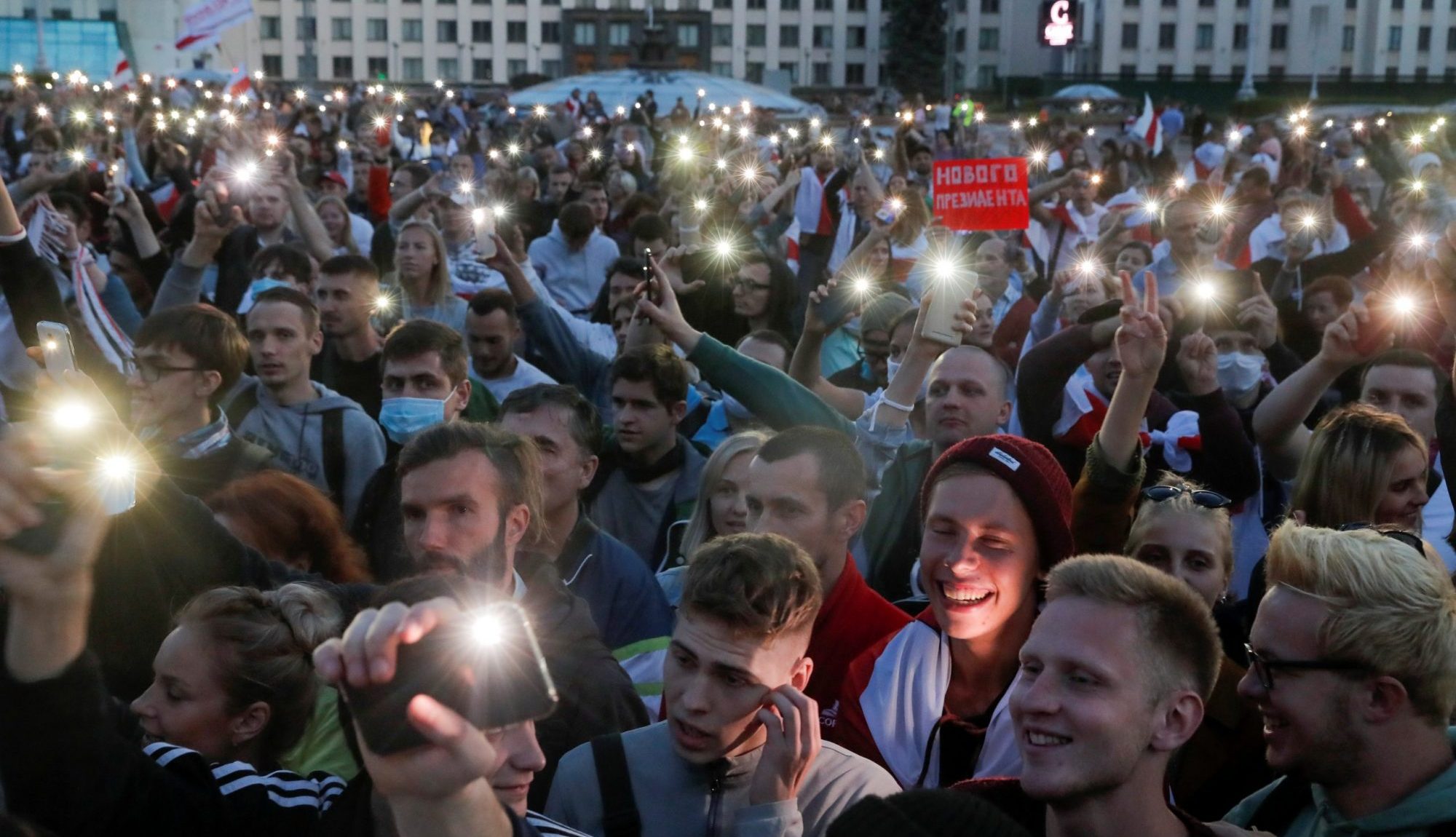
Above photo: People gather on Independence Square in Minsk on August 22. Reuters/Vasily Fedosenko.
On August 15 we explained why the color revolution in Belarus would fail. Belarus’ President Alexander Lukashenko had offered President Vladimir Putin of Russia to finally implement the long delayed Union State that will unite Belarus with Russia. In exchange he wanted full Russian backing for shutting down the U.S. led color revolution against him. Putin accepted the deal. In consequence:
Lukashenko, and his police, will not hang from a pole. Russia will take care of the problem and the Union State will finally be established.That does not mean that the color revolution attempt is over. The U.S. and its lackey Poland will not just pack up and leave. But with the full backing from Russia assured, Lukashenko can take the necessary steps to end the riots.
And that is what he did. Lukashenko continued to allow demonstrations but when on Sunday the demonstrators were directed to storm the presidential palace they saw a theatrical but strong response:
The Polish-run Nexta Telagram channel (which is the main medium used by the Empire to overthrow Lukashenko) initially called for a peaceful protest, but at the end of the day a call was made to try to take over the main Presidential building. When the rioters (at this point we are dealing with an illegal, violent, attempt to overthrow the state – so I don’t call these people demonstrators) got to the building they were faced with a real “wall” of riot cops in full gear: this (really scary) sight was enough to stop the rioters who stood for a while, and then had to leave.Second, Lukashenko did something rather weird, but which makes perfectly good sense in the Belarusian context: he dressed himself in full combat gear, grabbed an AKSU-74 assault rife, dressed his (15 year old!) son also in full combat gear (helmet included) and flew in his helicopter over Minsk and then landed in the Presidential building. They then walked to the riot cops, where Lukashenko warmly thanked them and which resulted in the full police force giving him a standing ovation. To most of us this behavior might look rather outlandish if not outright silly. But in the context of the Belarusian crisis, which is a crisis primarily fought in the informational realm, it makes perfectly good sense.
The protesters, which police had earlier identified as “rich city kids, the children of rich parents who are fed up with the well-fed life”, did not have the stomach to attack a well armed and motivated police force.
The NATO lobby shop Atlantic Council has also recognized that fact and bemoans it:
The protesters are generally very sweet, polite, and peaceful. Many are young, middle class Belarusians who work in the country’s booming IT industry and come to rallies dressed in form-fitting hipster ensembles. Unlike events in Kyiv in 2013-14, there is no militant edge to the demonstrations. Indeed, this revolution is so velvet that at times it feels positively sleepy. For better or worse, there is a marked absence of the rough and stalwart young men capable of making liberals uncomfortable or leading the resistance if and when the authoritarian state decides to deploy force.
Without Nazi stormtroopers like the U.S. used during the 2014 Maidan riots in Ukraine there is no chance to overthrow Lukashenko. With such troops the fight would end in a massacre and Lukashenko would still be the winner. The author rightly concludes:
The resistance of the Lukashenka regime is strengthening by the day. With Russia now seemingly standing firmly behind Lukashenka, photogenic rallies and patchy strike action will not be enough to bring about historic change.
It is over. The ‘patchy strikes’ were never real industrial actions. A few journalists of the Belarus state TV went on a strike. They were unceremoniously fired and replaced with Russian journalists. A few hundred workers at the MTZ Minsk Tractor Works did a walk out. But MTZ has 17,000 employees and the 16,500+ who did not walk out know very well why they still have their jobs. Should Lukashenko fall it is highly likely that their state owned company will be sold off for pennies and immediately ‘right sized’ meaning that most of them would be out of work. During the last 30 years they have seen that happen in every country around Belarus. There have no urge to experience that themselves.
On Monday the leader of the earlier MTZ walk out, one Sergei Dylevsky, was arrested while he agitated for more strikes. Dylevsky is a member of the self-proclaimed Coordination Council of the opposition which demands negotiations over the presidency. Other members of the council have been called in for questioning by state investigators over a criminal case against the council.
Meanwhile the rather hapless opposition candidate Sviatlana Tsikhanouskaya, who falsely claimed to have won the election, is in Lithuania. She is supposed to be an English teacher but has difficulties reading the English text begging (vid) for ‘western’ support. She has already met various ‘western’ politicians including the General Secretary of the German Christian Democratic Union party of chancellor Angela Merkel, Peter Zeimiag, and the U.S. Deputy Secretary of State Stephen Biegun. Neither will be able to help her.
With Russia’s backing the military, political and economic stability of Belarus is for now guaranteed. Lukashenko will at some point be ousted but that will be at a time and in a way that is convenient for Russia and not because some hapless NED financed IT hipsters try to stage a revolution.
Related posts:
Views: 0
 RSS Feed
RSS Feed

















 August 29th, 2020
August 29th, 2020  Awake Goy
Awake Goy  Posted in
Posted in  Tags:
Tags: 
















